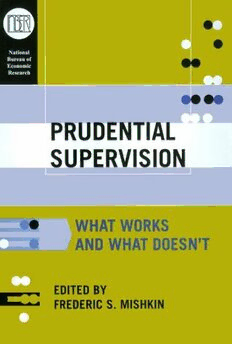
Prudential Supervision: What Works and What Doesn't PDF
379 Pages·2002·1.716 MB·English
Most books are stored in the elastic cloud where traffic is expensive. For this reason, we have a limit on daily download.
Preview Prudential Supervision: What Works and What Doesn't
Description:
Since banking systems play a crucial role in maintaining the overall health of the economy, the adverse effects of poorly supervised systems may be quite severe. Without some form of vigilant external oversight, banking systems could fall prey to excessive risk taking, moral hazard, and corruption. Prudential supervision provides that oversight, using government regulation and monitoring to ensure the soundness of the banking system and, by extension, the economy at large. The contributors to this thoughtful volume examine the current state of prudential supervision, focusing on fundamental issues and key pragmatic concerns. Why is prudential supervision so important? What kinds of excess must it guard against? What particular forms does it take? Which of these are the most effective deterrents against mismanagement and system overload in today's rapidly shifting financial climate? The contributors foresee a continued movement beyond simple regulatory rules in banking and toward a more active evaluation and supervision of a bank's risk management practices.
See more
The list of books you might like
Most books are stored in the elastic cloud where traffic is expensive. For this reason, we have a limit on daily download.
